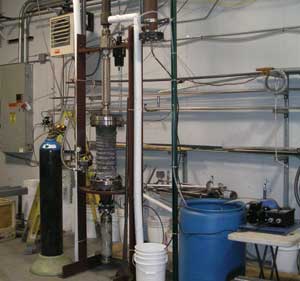CleanTech Biofuels, Merrick team in MSW-to-ethanol project




January 1, 1970
BY Bryan Sims
CleanTech Biofuels Inc. and its Denver-based engineering firm Merrick & Co. have begun developing a demonstration-scale facility that converts municipal solid waste (MSW) into ethanol at Hazen Research Inc.'s eight-acre research facility in Golden, Colo.
According to CleanTech Biofuels Chief Executive Officer Ed Hennessey, the initial phase of the project involves testing the viability of the company's biomass conversion technology, referred to as HFTA, in combination with its pressurized-steam classification technology that converts MSW to fuel-grade ethanol.
To accomplish this, the St. Louis-based company purchased a reactor system from the Forest Products Laboratory at the University of California, Berkeley in late January. At UC Berkeley, Hennessey said the reactor system successfully demonstrated the effectiveness of the HFTA cellulose conversion technology using wood waste feedstocks. The technology was then reassembled at Hazen's research site, where CleanTech Biofuels is currently utilizing the reactor system in the project's first phase to optimize reaction conditions on what the company calls "process engineered fuel," or cellulosic biomass from MSW. The company plans to incorporate other cellulosic feedstocks-corn stover, wood waste and switchgrass-into the process, but MSW will be the primary feedstock.
"The purpose of the pilot project is to demonstrate the viability of the technologies, to get the operating data and to be able to forecast capital costs for a larger commercial plant once we've demonstrated it on a smaller scale," Hennessey said. Once initial tests are successful, CleanTech will utilize Hazen's research and development expertise in the energy field, and Merrick & Co.'s engineering services, to build a demonstration facility at Hazen's research site. Hazen will maintain all permits, licenses and other approvals necessary to complete the project. "We hope to be under construction on the demonstration plant around August," Hennessey said.
Once operational, the facility is projected to produce approximately 36,000 gallons of cellulosic ethanol per year from four tons of MSW per day, Hennessey said.
According to CleanTech Biofuels Chief Executive Officer Ed Hennessey, the initial phase of the project involves testing the viability of the company's biomass conversion technology, referred to as HFTA, in combination with its pressurized-steam classification technology that converts MSW to fuel-grade ethanol.
To accomplish this, the St. Louis-based company purchased a reactor system from the Forest Products Laboratory at the University of California, Berkeley in late January. At UC Berkeley, Hennessey said the reactor system successfully demonstrated the effectiveness of the HFTA cellulose conversion technology using wood waste feedstocks. The technology was then reassembled at Hazen's research site, where CleanTech Biofuels is currently utilizing the reactor system in the project's first phase to optimize reaction conditions on what the company calls "process engineered fuel," or cellulosic biomass from MSW. The company plans to incorporate other cellulosic feedstocks-corn stover, wood waste and switchgrass-into the process, but MSW will be the primary feedstock.
"The purpose of the pilot project is to demonstrate the viability of the technologies, to get the operating data and to be able to forecast capital costs for a larger commercial plant once we've demonstrated it on a smaller scale," Hennessey said. Once initial tests are successful, CleanTech will utilize Hazen's research and development expertise in the energy field, and Merrick & Co.'s engineering services, to build a demonstration facility at Hazen's research site. Hazen will maintain all permits, licenses and other approvals necessary to complete the project. "We hope to be under construction on the demonstration plant around August," Hennessey said.
Once operational, the facility is projected to produce approximately 36,000 gallons of cellulosic ethanol per year from four tons of MSW per day, Hennessey said.
Advertisement
Advertisement
Upcoming Events





